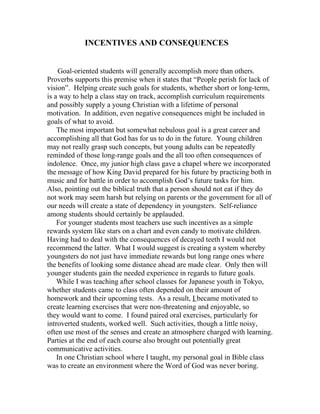
Incentives And Consequences Article
- 1. INCENTIVES AND CONSEQUENCES Goal-oriented students will generally accomplish more than others. Proverbs supports this premise when it states that “People perish for lack of vision”. Helping create such goals for students, whether short or long-term, is a way to help a class stay on track, accomplish curriculum requirements and possibly supply a young Christian with a lifetime of personal motivation. In addition, even negative consequences might be included in goals of what to avoid. The most important but somewhat nebulous goal is a great career and accomplishing all that God has for us to do in the future. Young children may not really grasp such concepts, but young adults can be repeatedly reminded of those long-range goals and the all too often consequences of indolence. Once, my junior high class gave a chapel where we incorporated the message of how King David prepared for his future by practicing both in music and for battle in order to accomplish God’s future tasks for him. Also, pointing out the biblical truth that a person should not eat if they do not work may seem harsh but relying on parents or the government for all of our needs will create a state of dependency in youngsters. Self-reliance among students should certainly be applauded. For younger students most teachers use such incentives as a simple rewards system like stars on a chart and even candy to motivate children. Having had to deal with the consequences of decayed teeth I would not recommend the latter. What I would suggest is creating a system whereby youngsters do not just have immediate rewards but long range ones where the benefits of looking some distance ahead are made clear. Only then will younger students gain the needed experience in regards to future goals. While I was teaching after school classes for Japanese youth in Tokyo, whether students came to class often depended on their amount of homework and their upcoming tests. As a result, I became motivated to create learning exercises that were non-threatening and enjoyable, so they would want to come. I found paired oral exercises, particularly for introverted students, worked well. Such activities, though a little noisy, often use most of the senses and create an atmosphere charged with learning. Parties at the end of each course also brought out potentially great communicative activities. In one Christian school where I taught, my personal goal in Bible class was to create an environment where the Word of God was never boring.
- 2. Using felt needs like the serious illness of a student’s parent brought a seriousness in prayer and Bible study that greatly motivated those close to the student. I did not overtly tie the lesson to those felt needs but attempted to do so in discreet ways simply by the topics we covered. In addition, we usually had a Bible game day after every serious test to make sure “the joy of the Lord’ was not lost before we plowed ahead with the coursework. Future field trips tied to material being covered often piques students’ interests to learn more. There remains almost no limit to such connections between coursework and field trips. Here are a few ideas: Biology - Study of plants and visiting an arboretum Biology – Study of animals tied to visiting a zoo Literature – Study of Shakespeare and attending a local play Physics – Study of aerodynamics and visiting an aircraft museum Art – Study of a certain art era and visiting an art museum Perhaps, the toughest place I have experienced to create incentives to learn was while teaching in the Middle East. At one military school most of what occurred was negative; this included standing students outside in the sun when they misbehaved or standing them up in the classroom when they fell asleep. At other teaching positions in the Middle East, student lunch get-togethers with ethnic foods brought life into the classroom and provided communicative activities. As I mentioned earlier about my experiences in Japan, end-of-course parties also motivated students. (Here’s a little side note: For teachers, particularly those who have just graduated, the Association of Christian Schools International internet site has an overseas section that might be the connection to needed experience as a teacher.) Whatever the incentive and/or consequences used, it would seem best to have them fit the occasion as closely as possible. Overblown consequences and/or incentives may even become counterproductive. However, creating few if any goals whatsoever for students will fail to use one of the most important motivational tools in the classroom. Identifying and incorporating the purposes and plans of God in young Christians’ lives today will help make sure it continues into the future. In other words, the more goal- oriented practices are used within the classroom the more students will get a vision for their own future that may even transcend the downward pull of our worldly culture. Craig Dressler, the author, has taught in the Far and Middle East and in Christian institutions in the U.S. for about fifteen years. He has written a
- 3. number of books including Keys To Destiny which is available from amazon.com. He is also involved with Unreached Peoples’ Missions which supplies scriptures to national ministries in SE Asia.
